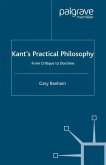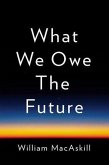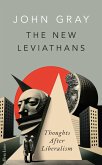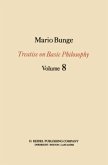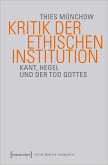- Gebundenes Buch
- Merkliste
- Auf die Merkliste
- Bewerten Bewerten
- Teilen
- Produkt teilen
- Produkterinnerung
- Produkterinnerung
Lecture notes taken by Kant's students of his university courses in ethics.
Andere Kunden interessierten sich auch für
![Kant¿s Practical Philosophy Kant¿s Practical Philosophy]() G. BanhamKant¿s Practical Philosophy75,99 €
G. BanhamKant¿s Practical Philosophy75,99 €![What We Owe to Each Other What We Owe to Each Other]() Tm ScanlonWhat We Owe to Each Other34,99 €
Tm ScanlonWhat We Owe to Each Other34,99 €![What We Owe the Future What We Owe the Future]() William MacAskillWhat We Owe the Future20,99 €
William MacAskillWhat We Owe the Future20,99 €![The New Leviathans The New Leviathans]() John GrayThe New Leviathans27,99 €
John GrayThe New Leviathans27,99 €![Die Idee der Freiheit und ihre Semantiken Die Idee der Freiheit und ihre Semantiken]() Die Idee der Freiheit und ihre Semantiken39,00 €
Die Idee der Freiheit und ihre Semantiken39,00 €![Treatise on Basic Philosophy Treatise on Basic Philosophy]() M. BungeTreatise on Basic Philosophy77,99 €
M. BungeTreatise on Basic Philosophy77,99 €![Kritik der ethischen Institution Kritik der ethischen Institution]() Thies MünchowKritik der ethischen Institution39,00 €
Thies MünchowKritik der ethischen Institution39,00 €-
-
-
Lecture notes taken by Kant's students of his university courses in ethics.
Hinweis: Dieser Artikel kann nur an eine deutsche Lieferadresse ausgeliefert werden.
Hinweis: Dieser Artikel kann nur an eine deutsche Lieferadresse ausgeliefert werden.
Produktdetails
- Produktdetails
- Verlag: Cambridge University Press
- Seitenzahl: 540
- Erscheinungstermin: 31. März 2008
- Englisch
- Abmessung: 240mm x 161mm x 33mm
- Gewicht: 969g
- ISBN-13: 9780521560610
- ISBN-10: 0521560616
- Artikelnr.: 23819110
- Herstellerkennzeichnung
- Libri GmbH
- Europaallee 1
- 36244 Bad Hersfeld
- gpsr@libri.de
- Verlag: Cambridge University Press
- Seitenzahl: 540
- Erscheinungstermin: 31. März 2008
- Englisch
- Abmessung: 240mm x 161mm x 33mm
- Gewicht: 969g
- ISBN-13: 9780521560610
- ISBN-10: 0521560616
- Artikelnr.: 23819110
- Herstellerkennzeichnung
- Libri GmbH
- Europaallee 1
- 36244 Bad Hersfeld
- gpsr@libri.de
Immanuel Kant ( 22 April 1724 - 12 February 1804) was an influential German philosopher[23] in the Age of Enlightenment. In his doctrine of transcendental idealism, he argued that space, time, and causation are mere sensibilities; "things-in-themselves" exist, but their nature is unknowable.[24][25] In his view, the mind shapes and structures experience, with all human experience sharing certain structural features. In one of his major works, the Critique of Pure Reason (1781; second edition 1787),[26] he drew a parallel to the Copernican revolution in his proposition that worldly objects can be intuited a priori ('beforehand'), and that intuition is therefore independent from objective reality.[b] Kant believed that reason is also the source of morality, and that aesthetics arise from a faculty of disinterested judgment. Kant's views continue to have a major influence on contemporary philosophy, especially the fields of epistemology, ethics, political theory, and post-modern aesthetics. He attempted to explain the relationship between reason and human experience and to move beyond the failures of traditional philosophy and metaphysics. He wanted to put an end to what he saw as an era of futile and speculative theories of human experience, while resisting the skepticism of thinkers such as David Hume. He regarded himself as showing the way past the impasse between rationalists and empiricists,[28] and is widely held to have synthesized both traditions in his thought.[29] Kant was an exponent of the idea that perpetual peace could be secured through universal democracy and international cooperation. He believed that this would be the eventual outcome of universal history, although it is not rationally planned.[30] The nature of Kant's religious ideas continues to be the subject of philosophical dispute, with viewpoints ranging from the impression that he was an initial advocate of atheism who at some point developed an ontological argument for God, to more critical treatments epitomized by Schopenhauer, who criticized the imperative form of Kantian ethics as "theological morals" and the "Mosaic Decalogue in disguise",[31] and Nietzsche, who claimed that Kant had "theologian blood"[32] and was merely a sophisticated apologist for traditional Christian faith
Introduction J. B. Schneedwind
Part I. Kant's Practical Philosophy: 1. Herder's lecture notes (selections)
Part II. Moral Philosophy: 2. Collins's lecture notes
Part III. Morality According to Professor Kant: 3. Mrongovius's second set of lecture notes (selections)
Part IV. Kant on the Metaphyscics of Morals: 4. Vigilantius's lecture notes.
Part I. Kant's Practical Philosophy: 1. Herder's lecture notes (selections)
Part II. Moral Philosophy: 2. Collins's lecture notes
Part III. Morality According to Professor Kant: 3. Mrongovius's second set of lecture notes (selections)
Part IV. Kant on the Metaphyscics of Morals: 4. Vigilantius's lecture notes.
Introduction J. B. Schneedwind
Part I. Kant's Practical Philosophy: 1. Herder's lecture notes (selections)
Part II. Moral Philosophy: 2. Collins's lecture notes
Part III. Morality According to Professor Kant: 3. Mrongovius's second set of lecture notes (selections)
Part IV. Kant on the Metaphyscics of Morals: 4. Vigilantius's lecture notes.
Part I. Kant's Practical Philosophy: 1. Herder's lecture notes (selections)
Part II. Moral Philosophy: 2. Collins's lecture notes
Part III. Morality According to Professor Kant: 3. Mrongovius's second set of lecture notes (selections)
Part IV. Kant on the Metaphyscics of Morals: 4. Vigilantius's lecture notes.



